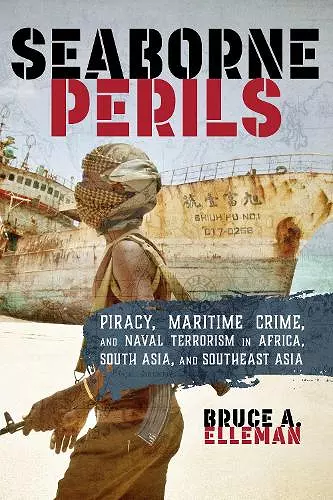Seaborne Perils
Piracy, Maritime Crime, and Naval Terrorism in Africa, South Asia, and Southeast Asia
Format:Paperback
Publisher:Bloomsbury Publishing PLC
Published:19th Feb '18
Currently unavailable, and unfortunately no date known when it will be back
This paperback is available in another edition too:
- Hardback£79.00(9781442260184)

This comprehensive survey of historical and contemporary issues related to maritime crime and piracy, with a special focus on Africa, South Asia, and Southeast Asia, explains why piracy is a growing problem and how it affects security policy making in the United States.
Here, piracy is defined as taking place on the high seas, while maritime crime takes place within a country’s territorial waters. Seaborne terrorism may occur in either one of these maritime zones. Maritime piracy can be divided into several categories, from pirates robbing a ship or its crew of petty items while at sea to taking a ship’s cargo and taking control of a vessel, reflagging it, and then using this captured ship to smuggle drugs, transport illegal immigrants, or conduct further acts of piracy. This is the most dangerous, not only because pirates can use a captured ship to carry out more raids, but also because they can use the ship’s identity papers to transport goods and weapons—potentially WMDs—into otherwise secure port areas.
A special concern to the US is that the threat of piracy is growing most quickly in parts of the world—such as Africa, South Asia, and Southeast Asia—where both global trade is rapidly expanding and where international terrorist groups are actively functioning or have supporters. This geographical overlap suggests that the risk that pirates and terrorists may one day cooperate to strike at the US or an ally is most likely also on the rise.
While many important African, South Asia, and Southeast Asian cases have received insufficient attention, many well-known historical piracy events stand in need of a reappraisal. This book integrates a number of multinational, multiregional, and historical cases of piracy, maritime crime, and seaborne terrorism to investigate whether piracy and other forms of maritime crime are becoming a major United States national security concern. It analyzes some of the most important cases, especially of the 19th, 20th, and early 21st centuries, as well as specific historical events. This allows to draw lessons as to what are the components of successful and unsuccessful piracy, common causes, the type of navy necessary to control it, and finally, possible military, political, and economic consequences. The book also discusses various types of cases, including parasitic, intrinsic, episodic,...
Bruce Elleman is a formidable scholar whose work has always brought together deep historical understanding and contemporary topicality. In focusing on the vital and neglected area of contextualised approaches to suppression of piracy as a threat to the security of the maritime commons, his latest work fills a gap in the literature of both maritime power and the Indo-Pacific region. -- John Reeve, UNSW Canberra, Australian Defence Force Academy
ISBN: 9781442260191
Dimensions: 231mm x 152mm x 15mm
Weight: 372g
272 pages